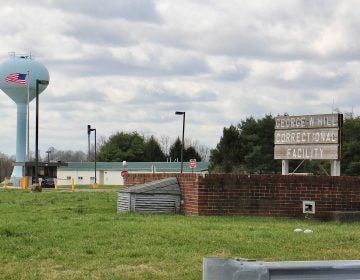Justice reforms move incrementally through Pennsylvania’s Senate
GOP Judiciary Committee Chairman Stewart Greenleaf is trying to pass as many justice overhaul proposals as possible before his retirement at the end of the year.

GOP Judiciary Committee Chairman Stewart Greenleaf is trying to shepherd nearly two dozen measures aimed at improving the criminal justice system into law before his retirement at the end of the year. (Carolyn Kaster/AP Photo)
A GOP-controlled Pennsylvania Senate committee is making slow, careful progress at changing the state’s justice system to focus on reforming the convicted and reducing prison populations.
The effort is led by the GOP Judiciary Committee Chairman Stewart Greenleaf, who is trying to shepherd nearly two dozen measures aimed at improving the criminal justice system into law before his retirement at the end of the year.
Greenleaf of Montgomery County has acknowledged that his desire to change the system came later in his long career, after years of taking a tough-on-crime approach. “The system we have now doesn’t work,” he said. “It’s a failure. Because punishment without rehabilitation is a failure.”
Now, he’s working to coax his GOP colleagues in the same direction.
“It’s a slow process. But it’s an education process,” he said. “I know they all say, ‘Well this is terrible, we’re siding with the defendant.’ We’re not siding with the defendant. Justice is justice — it’s a two-edged sword. It’s not just one way all the way, because you make mistakes when you do that.”
The Judiciary Committee narrowly passed a measure Tuesday to let judges sentence defendants to community service if they prove they can’t afford fines, court costs, or restitution.
Sen. Guy Reschenthaler, R-Allegheny, said the move would help keep people out of jail. Often, when defendants fail to make a court-mandated payment, a judge can hold them in contempt, which can lead to time behind bars. “It’s unconstitutional to send somebody to jail because they cannot afford to pay a fine. We no longer have debtors’ prisons,” he said.
And these jail terms typically end up costing the state more than the initial fine, he said.
A number of senators contested the measure — with some arguing it is particularly improper to allow community service as a replacement for restitution.
“I guarantee you there are a lot of people who are low-income, who commit a crime against other low-income people who have done nothing wrong, who are struggling every day. They’re going to take a loss,” said Sen. Randy Vulakovich, R-Allegheny.
Recently, the full Senate also passed two Greenleaf bills. One would give inmates more time to appeal convictions, and the other would expand DNA testing. All told, Greenleaf said 20 bills are on his agenda.
A number have made it through the Judiciary panel, and sit in other committees or before the full Senate.
WHYY is your source for fact-based, in-depth journalism and information. As a nonprofit organization, we rely on financial support from readers like you. Please give today.





